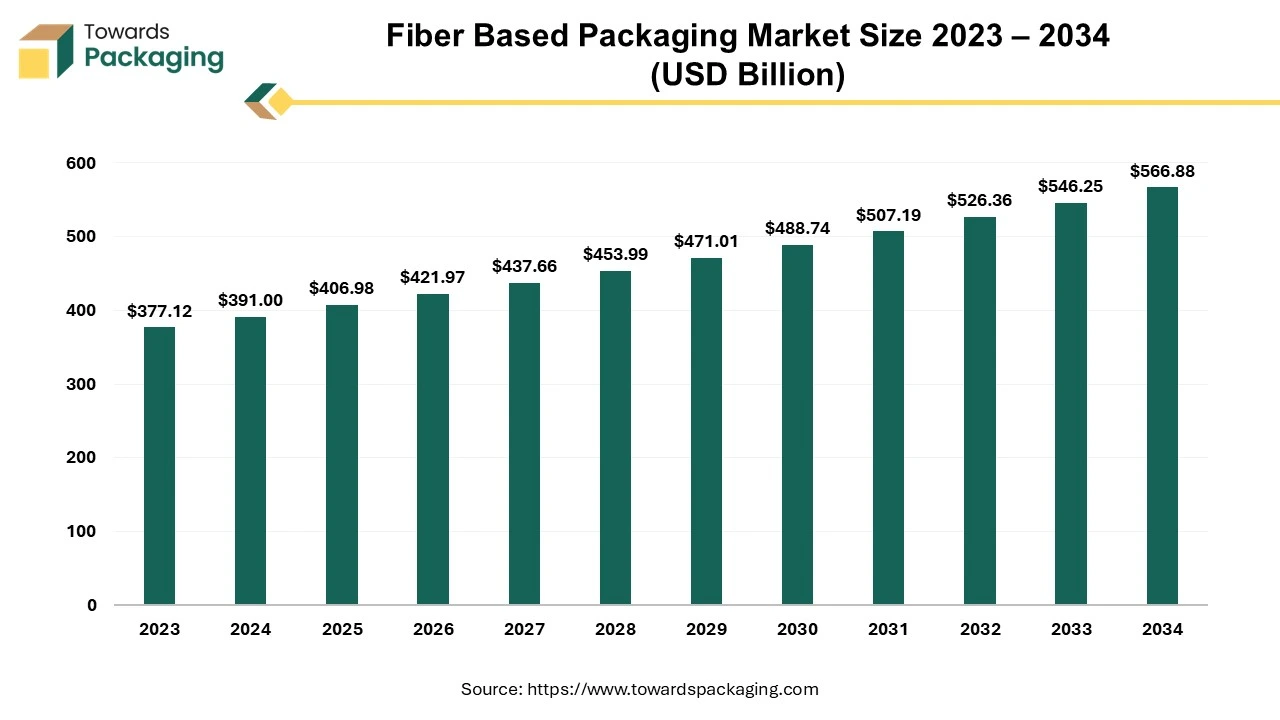Artificial Intelligence (AI) is revolutionizing various industries, and the fiber-based packaging sector is no exception. From improving material efficiency to enhancing quality control, AI is transforming packaging solutions, making them more sustainable, innovative, and efficient. As the global fiber-based packaging market is experiencing significant growth—reaching US$ 377.12 billion in 2023 and projected to hit US$ 566.88 billion by 2034, expanding at a CAGR of 3.85%—the integration of AI is expected to further accelerate this growth, driving advancements in multiple areas. Let’s explore how AI is reshaping this critical industry in several key domains.

Get All the Details in Our Solution – Download Brochure: https://www.towardspackaging.com/download-brochure/5384
AI’s ability to analyze large datasets and recognize patterns is unlocking new possibilities in packaging design. By utilizing machine learning algorithms, AI can identify ways to minimize material waste while maintaining the strength-to-weight ratio necessary for structural integrity. This allows companies to design fiber-based packaging that uses fewer resources without sacrificing durability. The technology analyzes patterns in material utilization, enabling smarter decisions in the production process and helping to create packaging that is more efficient and cost-effective.
Enhancing Quality Control
In fiber-based packaging manufacturing, quality control is paramount. AI-powered computer vision systems are taking quality control to the next level by detecting defects in real-time during production. These systems can spot issues such as inconsistencies in printing, flaws in raw materials, or defects in the final product that may have been missed by human inspectors. With AI’s precision, the packaging industry can ensure a higher standard of product quality, reducing waste and preventing costly defects.
Optimizing the Supply Chain
AI plays a critical role in streamlining supply chain operations for fiber-based packaging. With its predictive capabilities, AI can forecast demand patterns, optimize inventory management, and refine procurement processes. By improving these elements, companies can reduce lead times and costs associated with material shortages or overstocking. Furthermore, AI can enhance logistics by determining the most efficient shipping routes, tracking deliveries in real-time, and ensuring timely arrival of materials and finished products.
Advancing Material Innovation
Sustainability is at the forefront of the fiber-based packaging industry, and AI is accelerating material innovation. AI helps researchers explore new sustainable materials or combinations of fibers that are lighter, stronger, and more biodegradable. By simulating the properties of different materials and testing various formulations virtually, AI can expedite the development of more eco-friendly packaging options. This reduces the environmental impact of packaging and helps companies meet the growing demand for sustainable products.
Minimizing Waste and Optimizing Production
Waste reduction is another critical benefit AI offers the fiber-based packaging industry. AI can optimize production schedules to ensure that materials are used more efficiently, minimizing waste during manufacturing. It can also monitor the entire lifecycle of packaging, ensuring that designs are created with recyclability or reuse in mind. By measuring the environmental impact of operations, AI helps companies make more informed decisions that support sustainable practices, reducing waste and improving overall resource utilization.
Tailoring Packaging to Consumer Demands
Consumer preferences for packaging are evolving, with a strong emphasis on sustainability, functionality, and aesthetics. AI can analyze consumer behavior and market trends, offering valuable insights that help packaging companies meet these demands. This data enables companies to design packaging that aligns with consumer expectations, whether it’s more environmentally friendly or visually appealing. AI can also guide brands in selecting the right fibers or packaging formats that resonate with eco-conscious consumers, thus enhancing market competitiveness.
Automation in Manufacturing
In the fiber-based packaging sector, AI-driven automation is revolutionizing manufacturing processes. Robotics powered by AI can perform tasks like cutting, folding, and assembly with remarkable precision. This automation improves throughput, reduces human error, and cuts labor costs. With AI-powered robotics, packaging manufacturers can achieve higher efficiency and consistency while reducing their dependence on manual labor.
Predictive Maintenance and Equipment Optimization
AI is transforming maintenance operations in fiber-based packaging plants. By analyzing sensor data and monitoring machinery performance, AI can predict equipment malfunctions or maintenance needs before they occur. This proactive approach reduces downtime and ensures smooth manufacturing operations. Furthermore, AI’s ability to optimize machinery usage helps extend the lifespan of equipment, leading to cost savings and enhanced production reliability.
Invest in Our Premium Strategic Solution: https://www.towardspackaging.com/price/5384
Get the latest insights on packaging industry segmentation with our Annual Membership – https://www.towardspackaging.com/get-an-annual-membership
If you have any questions, please feel free to contact us at sales@towardspackaging.com
Browse our Brand-New Journal:
https://www.towardshealthcare.com
https://www.towardsautomotive.com
For Latest Update Follow Us: https://www.linkedin.com/company/towards-packaging/
Get Our Freshly Printed Chronicle: https://www.packagingwebwire.com/